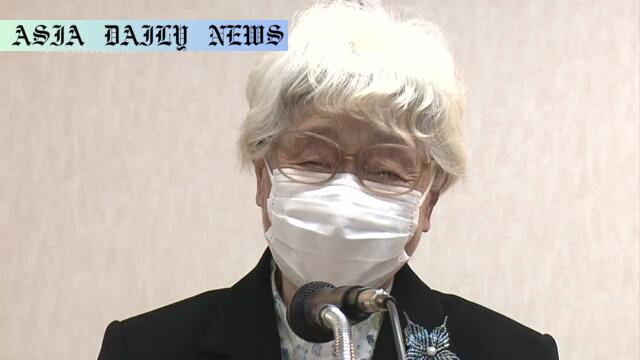Abductees: The last surviving parent of abductees urges the Japanese government to bring back abducted citizens from North Korea.
Abductees’ families face decades without resolution.
Yokota Sakie, aged 89, passionately calls for action.
Japanese government recognizes 17 abducted citizens.

A Mother’s Tireless Crusade for Justice
The pain of losing a loved one under unresolved circumstances is indescribable, and for Yokota Sakie, the mother of one such individual abducted by North Korea, that anguish has lasted for decades. At 89 years old, Yokota remains a beacon of hope and action, urging both Japanese officials and the international community to rescue the remaining abductees. Her daughter, Megumi, was taken in 1977 when she was just 13 years old, in what remains one of the more shocking instances of forced abduction perpetrated by North Korea on foreign nationals.
Honoring the Loss of a Fellow Campaigner
At a Tokyo rally, Sakie renewed her heartfelt plea following the passing of another prominent figure in this fight, Arimoto Akihiro. As the father of Keiko, abducted in 1983, Arimoto had tirelessly sought justice but passed away last week at the age of 96 without ever knowing his daughter’s fate. His death marked a tragic milestone, leaving Sakie the last surviving parent among those recognized as victims’ families by the Japanese government. The rally also served as a moment of reflection for all those who continue to bear the unresolved pain of North Korea’s actions.
A Frustrating Lack of Progress
Japan officially acknowledges 17 citizens as having been abducted by North Korea, dating back to the 1970s and 1980s. Five individuals were allowed to return following bilateral negotiations in 2002. However, the whereabouts of the remaining 12 remain unknown—a grim fact that Sakie is not hesitant to highlight. In her impassioned address at the rally, she directly confronted government officials, questioning what tangible efforts had been made to bring these individuals home. Her criticism resonates deeply among campaigners who feel that the Japanese authorities have not been proactive enough in keeping this issue at the forefront of diplomatic discussions.
A Glimmer of Hope Amidst Grief
Sakie’s determination remains unshaken despite the uphill battle. Her belief in the possibility of a joyful reunion persists, even as the years pass and hopes wane for many. She expressed her longing for all abductees to be found in good health, fostering a sense of optimism among those who gathered in support. Moreover, her courageous rhetoric serves to remind the world that these victims are not mere statistics but individuals whose lives hold immense value.
International Implications and Diplomatic Strains
The abduction issue is not only a direct affront to Japan but also a larger violation of international human rights. The situation has strained Japan’s relations with North Korea for decades, impeding efforts to normalize relations. Many believe that international pressure must be leveraged more effectively, with countries worldwide standing united to demand accountability for these inhumane practices. Without global solidarity, Yokota Sakie’s cries for justice may fall on deaf ears.
Empathy for the Families: A Call for Action
The story of the abductees is a somber reminder that the pain of uncertainty can linger indefinitely. It underscores the value of concerted human rights advocacy and places a moral responsibility on all stakeholders to prioritize this issue. For the families left behind, the closure remains elusive. They deserve a conclusion that validates their suffering and restores some semblance of peace.
As Sakie continues her advocacy, it is imperative for both governments and citizens to stand alongside her. Only through persistent efforts can justice for these victims and their grieving families be realized.



Commentary
The Emotional Weight of Uncertainty
The plight of abductees and their families resonates profoundly, particularly as we reflect on the passing of Arimoto Akihiro. His death is a tragic reminder of how unresolved tragedies often span generations, leaving behind a legacy of pain and longing. Yokota Sakie’s courage in the face of such adversity is not just admirable—it is deeply moving. Her story represents the universal human need for closure and justice.
A Test Against Time
As Sakie herself ages, the urgency of her plea becomes more evident. Time plays a crucial role here, not just in reuniting the abductees with their loved ones but also in preserving the legacy and voice of those who have campaigned tirelessly for justice. Hers is a voice that has called for accountability for decades, and it must not be drowned out by political inaction or distraction.
Accountability on a Global Scale
This issue is not just Japan’s burden to bear. The abductions carried out by North Korea are a stark violation of international laws and norms, and they warrant a broader global outcry. The lack of substantial progress in resolving this matter highlights a failure to address the larger problem of human rights abuses by totalitarian regimes. It’s a sobering space where diplomacy, activism, and empathy intersect.
A Call to Action
Ultimately, the strength of Yokota Sakie’s advocacy lies in its raw humanity. Her insistence reminds us that governments and individuals must collaborate to amplify the voices of those left unheard for far too long. As citizens of the world, we are reminded of the moral obligation to support such causes and push for justice in whatever ways we can.